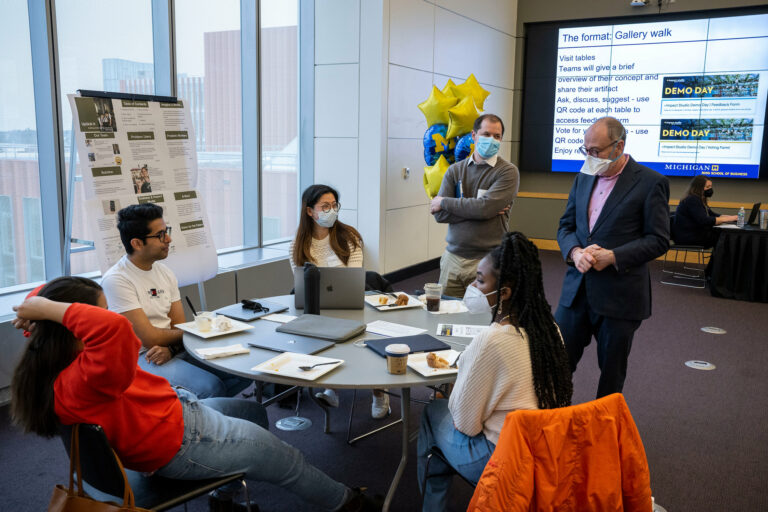
- Kim Kisner
- Education
- 01/17/2023
University of Michigan Students Set Out to Design Equitable Enterprises this Semester

Jerry Davis, Gilbert & Ruth Whitaker Professor of Management and faculty director of Business+Impact at the Michigan Ross School of Business, believes that with more available government funding than in the past, more entrepreneurs and businesses in Detroit are in a position to build equitable community wealth.
Davis, who received his Ph.D. from the Stanford University Graduate School of Business and taught at Northwestern and Columbia before moving to the University of Michigan, has published six books and dozens of articles in academic and business publications. His latest book is Taming Corporate Power in the 21st Century (Cambridge University Press, 2022). His focus is reshaping and developing businesses to be drivers of social and environmental change.
SBN Detroit spoke to Davis about his perspectives, the new graduate-level class, and what it ultimately means to Detroit businesses.

Q: Tell us about your concept of reshaping businesses into drivers of change.
A: I think there are two ways we can orient businesses toward a more equitable sustainable future.
First, we can take an existing business and reform it from the inside. This is often done by intrapreneurs.
Second, we can create new enterprises that are built right from the start.
My overall concept is that businesses can address bigger challenges than just shareholder value through reform or fresh starts. There are so many new building blocks available to businesses today that we can leverage to not only make money but also to begin to address the racial wealth gap, generational inequality, and the green energy transition.
Q: What do you mean by building blocks?
A: Technology has fundamentally changed the building blocks for creating an enterprise in the last fifteen years. There are dozens of new ways to raise capital that didn’t exist ten to fifteen years ago. There are new ways to find distribution channels, new ways to work with suppliers and labor, new legal formats, and the list goes on.
Q: How do the United Nations Sustainability Development Goals inform your work?
A: Since the inception of the Sustainability Development Goals in 2015, I’ve used them as a GPS of sorts for orienting what businesses can do to contribute to social benefit. I’ve integrated this into my teaching and writing and research.
Drilling down …If you had to pick one threat we are facing on a global basis that businesses can work better to address – and that creates business opportunities – it’s the green energy transition. This is the thing in our generation that we need to accomplish starting today. And it’s impossible to address it with government action only. There is a central role for businesses to play in bringing about this transition.
And with the Inflation Reduction Act and Justice40 in place, there is no better opportunity to build green enterprises than right now.
Q: What are some of the opportunities provided by the Inflation Reduction Act?
A: As I said, the need for the green energy transition has never been greater. It is imperative for our species.
At the same time, we have the Biden-Harris administration launching the IRA, which creates huge incentives to electrify and transition to green energy. There is an astounding amount of money being allocated to homeowners and renters and drivers to help make this transition. You can simply go online and see the offerings – switching from a gas furnace to a heat pump offers free cash. There are huge tax benefits to electric vehicle owners. And low-income brackets receive even more benefits. I highly recommend the “Rewiring America” website.
From a business perspective, this is an opportunity like never before. Businesses that provide services around transitioning to green energy stand to prosper greatly through this funding. These opportunities represent a chance to build generational wealth.
Q: Can you explain more about how the act supports generational-wealth building?
A: Detroit has been hit hard in several ways … the mortgage crisis, residential flight, municipal bankruptcy, and the list goes on. These have robbed people of opportunities to create prosperity for themselves and their families. So, this funding represents an especially well-placed opportunity for cities like Detroit.
According to the White House, the Justice40 initiative means that “40 percent of the overall benefits of certain federal investments flow to disadvantaged communities that are marginalized, underserved, and overburdened by pollution.” That includes “climate change, clean energy, and energy efficiency, clean transit, affordable and sustainable housing, training and workforce development, remediation and reduction of legacy pollution, and the development of critical clean water and wastewater infrastructure.”
When you combine the IRA and Justice40, it opens the spigot for cash allocated toward environmental initiatives.
So again, the opportunity to start a new business and build community wealth has never been greater than it is right now.
This is the impetus behind a new graduate class starting this week called “Impact Studio: Designing the Equitable Enterprise” that I am teaching with my co-instructor Cat Johnson.

Q: Tell us more about the class and how you see it impacting both the students and local businesses.
A: The class focuses on how to use the new building blocks of business to create enterprises in Detroit that will facilitate the green energy transition.
Students will interview dozens of Detroit businesses and members of the community to better understand the needs and pain points around energy. They will then map out the opportunities.
For example, let’s say a building contractor is looking to use heat pumps but can’t find someone with the skill to install them, or can’t find a vendor for them. This represents an opportunity. Maybe a college can create training programs for installation. Or find incentives to make heat pumps more widely available.
They will then go on to create what I call template business models – plausible, economically sustainable models that are replicable – and a set of how-to guides. The how-to guides will translate into plain English the ways in which entrepreneurs and communities can build on the IRA and the new building blocks of business. For example, how can I get access to the funds, what is the right tax incentive to use, etc.
So, the work we are doing involves trying to equip entrepreneurs, businesses, and communities with these tools to reform and revolutionize toward equitable and socially just enterprises involved in the green energy transition.
It’s a great way to bring the talents of U of M to bear on problems that benefit communities in Michigan and Detroit.
Q: How will the information be shared?
A: We did a version of this course last year focusing on the restaurant industry.
With over 100,000 restaurants closing during the pandemic, we saw a need to help local restaurants come up with more sustainable business models.
Students interviewed 25 local restaurant owners and 50 users. They built an opportunity map and published a set of how-to guides online and designed ten different business models.

This year’s “Impact Studio” course is a refinement of this format – obviously focused on the green energy transition – and will offer even deeper assistance for businesses, with guidance from community experts.
Q: What is your overall goal and hope – what achievements are desired from the work you are doing?
A: Well, I’m very enthusiastic about this. My family history is steeped in Detroit. All my grandparents moved to Detroit to work in the auto industry and spent decades doing so.
So, my dream of dreams is that this effort becomes the start of a transition in Detroit toward a new ecosystem of locally based enterprises around green energy. And, ideally, this creates an ongoing relationship between the University of Michigan and students and entrepreneurs in the city to help create viable green businesses.
Detroit is such a unique and magical place and if we can help find support and create new enterprises that make for a more sustainable world – that is the goal.
Be sure to subscribe to our newsletter for regular updates on sustainable business practices in and around Detroit.
Kim Kisner
- All
- Business
- Community
- Education
- Events

Unique Monique Scented Candles, a Detroit-based business founded by Monique Bounds., aims to produce candles and household products with clean ingredients and local supply chains. What began as a personal hobby during college has evolved into a full-time venture producing coconut oil and soy-based candles made with essential oils and locally sourced materials. SBN Detroit interviewed Bounds about launching a sustainable product line, sourcing challenges in Michigan, and...

Eastern Market Partnership, in collaboration with the City of Detroit’s Office of Sustainability Urban Agriculture Division, has announced $240,000 in grant funding to support Detroit-based farmers and farmer collectives. The grants will advance food access, climate education, sustainable land use, and economic opportunity, with priority given to Black- and Indigenous-led farms, youth-led initiatives, and projects rooted in historically disinvested neighborhoods. The recipients – ranging from cooperatives and community...

Citizen Robotics is a Detroit-based nonprofit that advances the use of robotics and digital manufacturing in residential construction, focusing on improving productivity, sustainability, and long-term affordability. Best known for its early work in 3D-printed housing, it explores how alternative construction methods and new financial models can reduce material waste, lower lifetime operating costs, and enhance the resilience of homes. SBN Detroit interviewed Tom Woodman, founder and president of...







